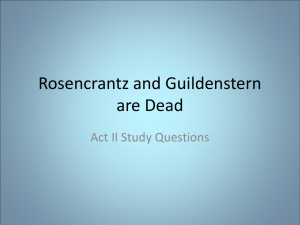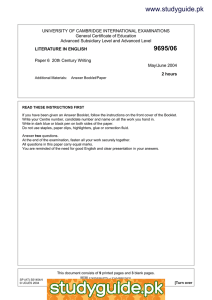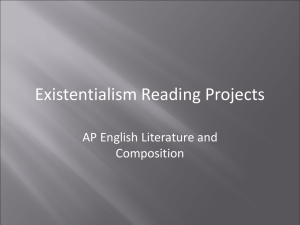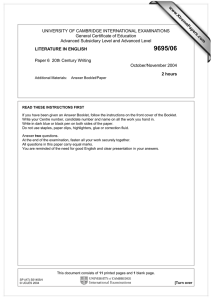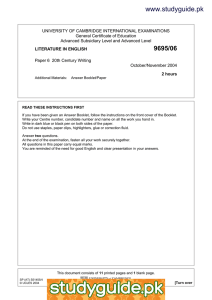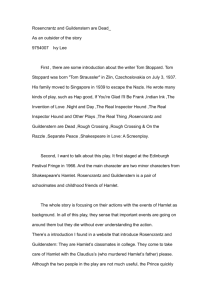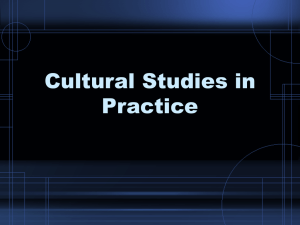UNIVERSITY OF CAMBRIDGE INTERNATIONAL EXAMINATIONS General Certificate of Education www.XtremePapers.com
advertisement
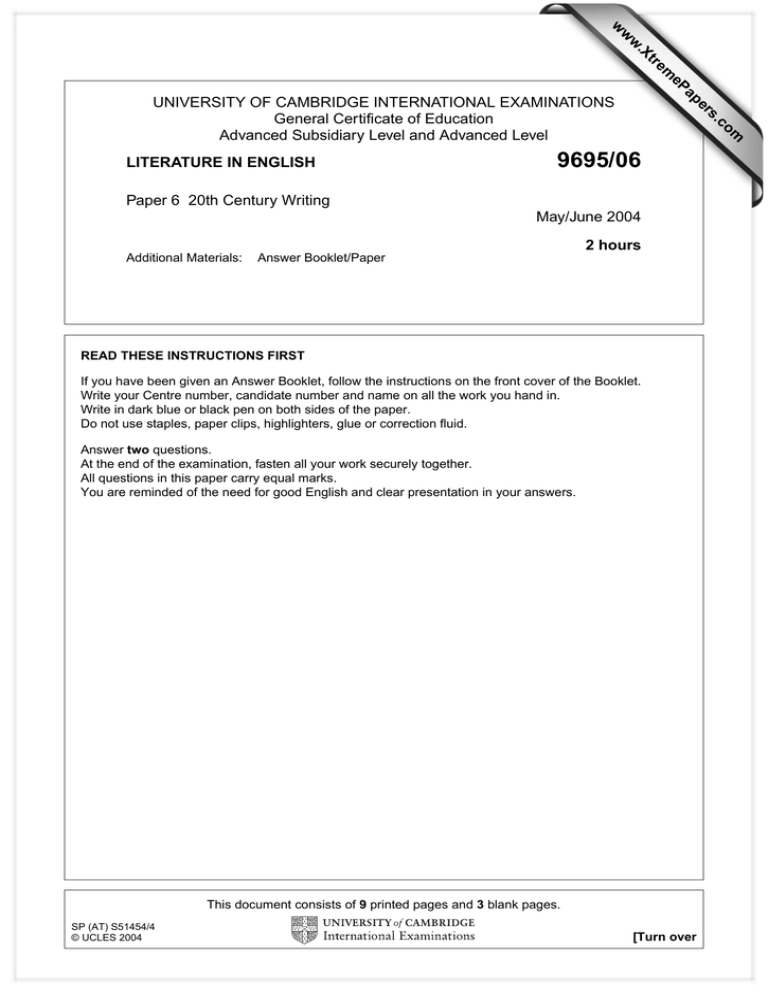
w w ap eP m e tr .X w om .c LITERATURE IN ENGLISH s er UNIVERSITY OF CAMBRIDGE INTERNATIONAL EXAMINATIONS General Certificate of Education Advanced Subsidiary Level and Advanced Level 9695/06 Paper 6 20th Century Writing May/June 2004 2 hours Additional Materials: Answer Booklet/Paper READ THESE INSTRUCTIONS FIRST If you have been given an Answer Booklet, follow the instructions on the front cover of the Booklet. Write your Centre number, candidate number and name on all the work you hand in. Write in dark blue or black pen on both sides of the paper. Do not use staples, paper clips, highlighters, glue or correction fluid. Answer two questions. At the end of the examination, fasten all your work securely together. All questions in this paper carry equal marks. You are reminded of the need for good English and clear presentation in your answers. This document consists of 9 printed pages and 3 blank pages. SP (AT) S51454/4 © UCLES 2004 [Turn over 2 JEAN RHYS: Wide Sargasso Sea 1 Either (a) How far and in what ways would you agree that Antoinette Cosway is presented as a victim in Wide Sargasso Sea? Or (b) The following passage concludes Wide Sargasso Sea. Comment on the effects achieved in the passage, showing how far the writing reflects concerns and methods characteristic of the novel as a whole. There were more candles on a table and I took one of them and ran up the first flight of stairs and the second. On the second floor I threw away the candle. But I did not stay to watch. I ran up the last flight of stairs and along the passage. I passed the room where they brought me yesterday or the day before yesterday, I don’t remember. Perhaps it was long ago for I seemed to know the house well. I knew how to get away from the heat and the shouting, for there was shouting now. When I was out on the battlements it was cool and I could hardly hear them. I sat there quietly. I don’t know how long I sat. Then I turned round and saw the sky. It was red and all my life was in it. I saw the grandfather clock and Aunt Cora’s patchwork, all colours. I saw the orchids and the stephanotis and the jasmine and the tree of life in flames. I saw the chandelier and the red carpet downstairs and the bamboos and the tree ferns, the gold ferns and the silver, and the soft green velvet of the moss on the garden wall. I saw my doll’s house and the books and the picture of the Miller’s Daughter. I heard the parrot call as he did when he saw a stranger. Qui est là? Qui est là? and the man who hated me was calling too, Bertha! Bertha!. The wind caught my hair and it streamed out like wings. It might bear me up, I thought, if I jumped to those hard stones. But when I looked over the edge I saw the pool at Coulibri. Tia was there. She beckoned to me and when I hesitated, she laughed. I heard her say. You frightened? And I heard the man’s voice. Bertha! Bertha! All this I saw and heard in a fraction of a second. And the sky so red. Someone screamed and I thought, Why did I scream? I called ‘Tia!’ and jumped and woke. Grace Poole was sitting at the table but she had heard the scream too, for she said. ‘What was that?’ She got up, came over and looked at me. I lay still, breathing evenly with my eyes shut. ‘I must have been dreaming,’ she said. Then she went back, not to the table but to her bed. I waited a long time after I heard her snore, then I got up, took the keys and unlocked the door. I was outside holding my candle. Now at last I know why I was brought here and what I have to do. There must have been a draught for the flame flickered and I thought it was out. But I shielded it with my hand and it burned up again to light me along the dark passage. Part Three © UCLES 2004 9695/06/M/J/04 5 10 15 20 25 3 KAZUO ISHIGURO: An Artist of the Floating World 2 Either (a) With reference to two characters, discuss Ishiguro’s treatment of the theme of integrity in An Artist of the Floating World. Or (b) The following passage opens the novel. In what ways does it prepare the reader for what is to come? If on a sunny day you climb the steep path leading up from the little wooden bridge still referred to around here as ‘the Bridge of Hesitation’, you will not have to walk far before the roof of my house becomes visible between the tops of two gingko trees. Even if it did not occupy such a commanding position on the hill, the house would still stand out from all others nearby, so that as you come up the path, you may find yourself wondering what sort of wealthy man owns it. But then I am not, nor have I ever been, a wealthy man. The imposing air of the house will be accounted for, perhaps, if I inform you that it was built by my predecessor, and that he was none other than Akira Sugimura. Of course, you may be new to this city, in which case the name of Akira Sugimura may not be familiar to you. But mention it to anyone who lived here before the war and you will learn that for thirty years or so, Sugimura was unquestionably amongst the city’s most respected and influential men. If I tell you this, and when arriving at the top of the hill you stand and look at the fine cedar gateway, the large area bound by the garden wall, the roof with its elegant tiles and its stylishly carved ridgepole pointing out over the view, you may well wonder how I came to acquire such a property, being as I claim a man of only moderate means. The truth is, I bought the house for a nominal sum – a figure probably not even half the property’s true value at that time. This was made possible owing to a most curious – some may say foolish – procedure instigated by the Sugimura family during the sale. It is now already a thing of some fifteen years ago. In those days, when my circumstances seemed to improve with each month, my wife had begun to press me to find a new house. With her usual foresight, she had argued the importance of our having a house in keeping with our status – not out of vanity, but for the sake of our children’s marriage prospects. I saw the sense in this, but since Setsuko, our eldest, was still only fourteen or fifteen, I did not go about the matter with any urgency. Nevertheless, for a year or so, whenever I heard of a suitable house for sale, I would remember to make enquiries. It was one of my pupils who first brought it to my attention that Akira Sugimura’s house, a year after his death, was to be sold off. That I should buy such a house seemed absurd, and I put the suggestion down to the exaggerated respect my pupils always had for me. But I made enquiries all the same, and gained an unexpected response. I received a visit one afternoon from two haughty grey-haired ladies, who turned out to be the daughters of Akira Sugimura. When I expressed my surprise at receiving such personal attention from a family of such distinction, the elder of the sisters told me coldly that they had not come simply out of courtesy. Over the previous months, a fair number of enquiries had been received for their late father’s house, but the family had in the end decided to refuse all but four of the applications. These four applicants had been selected carefully by family members on grounds purely of good character and achievement. ‘It is of the first importance to us’, she went on, ‘that the house our father built should pass to one he would have approved of and deemed worthy of it. Of course, circumstances oblige us to consider the financial aspect, but this is strictly secondary. We have therefore set a price.’ 5 10 15 20 25 30 35 40 45 October 1948 © UCLES 2004 9695/06/M/J/04 [Turn over 4 ELIZABETH JENNINGS: Selected Poems 3 Either (a) Discuss the ways in which Jennings treats the theme of nature in her poems. Refer to at least three poems in your answer. Or (b) Write a critical appreciation of the following poem, showing how far it seems to you to be characteristic of Jennings’s works. Father to Son I do not understand this child Though we have lived together now In the same house for years. I know Nothing of him, so try to build Up a relationship from how He was when small. Yet have I killed The seed I spent or sown it where The land is his and none of mine? We speak like strangers, there’s no sign Of understanding in the air. This child is built to my design Yet what he loves I cannot share. Silence surrounds us. I would have Him prodigal, returning to His father’s house, the home he knew, Rather than see him make and move His world. I would forgive him too, Shaping from sorrow a new love. Father and son, we both must live On the same globe and the same land. He speaks: I cannot understand Myself, why anger grows from grief. We each put out an empty hand, Longing for something to forgive. © UCLES 2004 9695/06/M/J/04 5 10 15 20 5 HAROLD PINTER: The Caretaker 4 Either (a) ‘Fantasy prevents all three characters from living their lives.’ How far do you agree with this view? Or (b) Consider the dramatic effectiveness of the following passage, showing how far you find its methods and concerns characteristic of the play as a whole. Davies: I used to know a bootmaker in Acton. He was a good mate to me. Pause. You know what that bastard monk said to me? Pause. How many more Blacks you got around here then? Aston: What? Davies: You got any more Blacks around here? Aston: (holding out the shoes). See if these are any good. Davies: You know what that bastard monk said to me? (He looks over to the shoes.) I think those’d be a bit small. Aston: Would they? Davies: No, don’t look the right size. Aston: Not bad trim. Davies: Can’t wear shoes that don’t fit. Nothing worse. I said to this monk, here, I said, look here, mister, he opened the door, big door, he opened it, look here, mister, I said, I come all the way down here, look, I said, I showed him these, I said, you haven’t got a pair of shoes, have you, a pair of shoes, I said, enough to keep me on my way. Look at these, they’re nearly out, I said, they’re no good to me. I heard you got a stock of shoes here. Piss off, he said to me. Now look here, I said, I’m an old man, you can’t talk to me like that, I don’t care who you are. If you don’t piss off, he says, I’ll kick you all the way to the gate. Now look here, I said, now wait a minute, all I’m asking for is a pair of shoes, you don’t want to start taking liberties with me, it’s taken me three days to get here, I said to him, three days without a bite, I’m worth a bite to eat, en I? Get out round the corner to the kitchen, he says, get out round the corner, and when you’ve had your meal, piss off out of it. I went round to this kitchen, see? Meal they give me! A bird, I tell you, a little bird, a little tiny bird, he could have ate it in under two minutes. Right, they said to me, you’ve had your meal, get off out of it. Meal? I said, what do you think I am, a dog? Nothing better than a dog. What do you think I am, a wild animal? What about them shoes I come all the way here to get I heard you was giving away? I’ve a good mind to report you to your mother superior. One of them, an Irish hooligan, come at me. I cleared out. I took a short cut to Watford and picked up a pair there. Got onto the North Circular, just past Hendon, the sole come off, right where I was walking. Lucky I had my old ones wrapped up, still carrying them, otherwise I’d have been finished, man. So I’ve had to stay with these, you see, they’re gone, they’re no good, all the good’s gone out of them. Aston: Try these. 5 10 15 20 25 30 35 Act 1 © UCLES 2004 9695/06/M/J/04 [Turn over 6 EDWARD ALBEE: Who’s Afraid of Virginia Woolf? 5 Either (a) The play has been described as both comic and tragic. Discuss the relation between comic and tragic elements in Who’s Afraid of Virginia Woolf? Or Honey: George: Martha: George: Martha: George: Martha: George Martha: George: Honey George: Nick: Martha: George: Martha: George Honey: Nick: Martha: George Martha: George: Honey Nick: George: (b) Discuss the following passage in detail, showing how far the central techniques and concerns of the play as a whole are evident here. When is. . . where is your son . . . coming home? [Giggles.] Ohhhh. [Too formal ] Martha? When is our son coming home? Never mind. No, no. . . I want to know. . . you brought it out into the open. When is he coming home, Martha? I said never mind. I’m sorry I brought it up. Him up. . . not it. You brought him up. Well, more or less. When’s the little bugger going to appear, hunh? I mean isn’t tomorrow meant to be his birthday, or something? I don’t want to talk about it! [falsely innocent ]: But Martha . . . I DON’T WANT TO TALK ABOUT IT! I’ll bet you don’t. [To HONEY and NICK] Martha does not want to talk about it . . . him. Martha is sorry she brought it up. . . him. [idiotically]: When’s the little bugger coming home? [Giggles.] Yes, Martha . . . since you had the bad taste to bring the matter up in the first place. . . when is the little bugger coming home? Honey, do you think you … ? George talks disparagingly about the little bugger because. . . well, because he has problems. The little bugger has problems? What problems has the little bugger got? Not the little bugger. . . stop calling him that! You! You’ve got problems. [feigned disdain]: I’ve never heard of anything more ridiculous in my life. Neither have I! Honey. . . George’s biggest problem about the little. . . ha, ha, ha,HA! . . . about our son, about our great big son, is that deep down in the private-most pit of his gut, he’s not completely sure it’s his own kid. [deeply serious]: My God, you’re a wicked woman. And I’ve told you a million times, baby. . . I wouldn’t conceive with anyone but you . . . you know that, baby. A deeply wicked person. [deep in drunken grief ]: My, my, my, my. Oh my. I’m not sure that this is a subject for. . . Martha’s lying. I want you to know that, right now, Martha’s lying. [MARTHA laughs.] There are very few things in this world that I am sure of. . . national boundaries, the level of the ocean, political allegiances, practical morality. . . none of these would I stake my stick on any more. . . but the one thing in this whole sinking world that I am sure of is my partnership, my chromosomological partnership in the. . . creation of our. . . blond-eyed, bluehaired . . . son. Act 1 © UCLES 2004 9695/06/M/J/04 5 10 15 20 25 30 35 40 7 TOM STOPPARD: Rosencrantz and Guildenstern are Dead 6 Either (a) How does Stoppard create the atmosphere of darkly humorous confusion in the play? Or (b) Consider the dramatic effectiveness of the following passage, showing how far you consider its methods and concerns characteristic of the play as a whole. Rosencrantz: Guildenstern: Player: Guildenstern: Player: Rosencrantz: Player: Rosencrantz: Guildenstern: Player: Guildenstern: Rosencrantz: Player: Guildenstern: Rosencrantz: Guildenstern: Rosencrantz: Guildenstern: Rosencrantz: Player: Guildenstern: Rosencrantz: Guildenstern: Rosencrantz: Guildenstern: Rosencrantz: Player: Guildenstern: Rosencrantz: Guildenstern: Rosencrantz: Guildenstern: Rosencrantz: Guildenstern: Rosencrantz: Guildenstern: Rosencrantz: Hamlet is not himself, outside or in. We have to glean what afflicts him. He doesn’t give much away. Who does, nowadays? He’s – melancholy. Melancholy? Mad. How is he mad? Ah. (To GUILDENSTERN) How is he mad? More morose than mad, perhaps. Melancholy. Moody. He has moods. Of moroseness? Madness. And yet. Quite. For instance. He talks to himself, which might be madness. If he didn’t talk sense, which he does. Which suggests the opposite. Of what? (Small pause.) I think I have it. A man talking sense to himself is no madder than a man talking nonsense not to himself. Or just as mad. Or just as mad. And he does both. So there you are. Stark raving sane. (Pause.) Why? Ah. (To ROSENCRANTZ) Why? Exactly. Exactly what? Exactly why. Exactly why what? What? Why? Why what, exactly? Why is he mad?! I don’t know! 5 10 15 20 25 30 35 40 Act 2 © UCLES 2004 9695/06/M/J/04 [Turn over 8 DEREK WALCOTT: Selected Poetry 7 Either (a) Discuss the ways in which the theme of love is treated in Derek Walcott’s verse, referring to at least two poems. Or (b) Write a critical appreciation of the following poem, showing how far it seems to you to be characteristic of Walcott’s methods and concerns. Ebb Year round, year round, we’ll ride this treadmill whose frayed tide fretted with mud leaves our suburban shoreline littered with rainbow muck, the afterbirth of industry, past scurf- 5 streaked bungalows and pioneer factory; but, blessedly, it narrows through a dark aisle of fountaining, gold coconuts, an oasis marked for the yellow Caterpillar tractor. We’ll watch this shovelled too, but as we file through its swift-wickered shade there always is some island schooner netted in its weave 10 15 like a lamed heron an oil-crippled gull; a few more yards upshore and it heaves free, it races the horizon with us, railed to one law, ruled, like the washed-up moon to circle her lost zone, her radiance thinned. © UCLES 2004 9695/06/M/J/04 20 9 EVELYN WAUGH: Decline and Fall 8 Either (a) Consider the portrayal and significance of Margot Beste-Chetwynde in Decline and Fall. Or (b) Discuss the effects of the following passage, relating it to the methods and concerns of the novel as a whole. Six days later the school was given a half-holiday, and soon after luncheon the bigamous union of Captain Edgar Grimes and Miss Florence Selina Fagan was celebrated at the Llanabba Parish Church. A slight injury to his hand prevented Paul from playing the organ. He walked down the church with Mr Prendergast, who, greatly to his dismay, had been instructed by Dr Fagan to give away the bride. ‘I do not intend to be present,’ said the Doctor. ‘The whole business is exceedingly painful to me.’ Everybody else, however, was there except little Lord Tangent, whose foot was being amputated at a local nursing-home. The boys for the most part welcomed the event as a pleasant variation to the rather irregular routine of their day. Clutterbuck alone seemed disposed to sulk. ‘I don’t suppose that their children will be terribly attractive,’ said BesteChetwynde. There were few wedding presents. The boys had subscribed a shilling each and had bought at a shop in Llandudno a silver-plated teapot, coyly suggestive of art nouveau. The Doctor gave them a cheque for twenty-five pounds. Mr Prendergast gave Grimes a walking-stick – ‘because he was always borrowing mine’ – and Dingy rather generously, two photograph frames, a calendar, and a tray of Benares brassware. Paul was the best man. The service passed off without a hitch, for Grimes’s Irish wife did not turn up to forbid the banns. Flossie wore a frock of a rather noticeable velveteen and a hat with two pink feathers to match. ‘I was so pleased when I found he didn’t want me to wear white,’ she said, ‘though, of course, it might have been dyed afterwards.’ Both bride and bridegroom spoke up well in the responses, and afterwards the Vicar delivered a very moving address on the subject of Home and Conjugal Love. ‘How beautiful it is,’ he said, ‘to see two young people in the hope of youth setting out with the Church’s blessing to face life together; how much more beautiful to see them when they have grown to full manhood and womanhood coming together and saying, “Our experience of life has taught us that one is not enough.” ’ The boys lined the path from the church door to the lychgate, and the head prefect said: ‘Three cheers for Captain and Mrs Grimes!’ Then they returned to the Castle. The honeymoon had been postponed until the end of term, ten days later, and the arrangements for the first days of their married life were a little meagre. ‘You must do the best you can,’ the Doctor had said. ‘I suppose you will wish to share the same bedroom. I think there would be no objection to your both moving into the large room in the West Tower. It is a little damp, but I daresay Diana will arrange for a fire to be lighted there. You may use the morning-room in the evenings, and Captain Grimes will of course, have his meals at my table in the dining-room, not with the boys. I do not wish to find him sitting about in the drawing-room, nor, of course, in my library. He had better keep his books and gown in the Common Room, as before. Next term I will consider some other arrangement. Perhaps I could hand over one of the lodges to you or fit up some sort of sitting-room in the tower. I was not prepared for a domestic upheaval.’ Diana, who was really coming out of the business rather creditably, put a bowl of flowers in their bedroom, and lit a fire of reckless proportions, in which she consumed the remains of a desk and two of the boys’ play-boxes. That evening, while Mr Prendergast was taking Prep. at the end of the passage, Grimes visited Paul in the Common Room. He looked rather uncomfortable in his evening clothes. Chapter 13 © UCLES 2004 9695/06/M/J/04 5 10 15 20 25 30 35 40 45 10 BLANK PAGE 9695/06/M/J/04 11 BLANK PAGE 9695/06/M/J/04 12 BLANK PAGE Copyright Acknowledgements Question 1 Question 2 Question 3 Question 4 Question 5 Question 6 Question 7 Question 8 Jean Rhys. Wide Sargasso Sea. Published by World Wide Books. Kazuo Ishiguro. Artist of the Floating World. Reproduced by permission of Faber and Faber. © Kazuo Ishiguro. Elizabeth Jennings. SELECTED POEMS. Reproduced by permission of David Highams Associate. © Elizabeth Jennings. Harold Pinter. The Caretaker. Published by Methuen. Extract from WHO’S AFRAID OF VIRGINIA WOOLF? by Edward Albee. Published by Jonathan Cape. Use by permission of Random House Group Limited. Tom Stoppard. Rosencrantz and Guildenstern are Dead. Published by Faber and Faber 1986. © Tom Stoppard. Derek Walcott. SELECTED POETRY. Published by Heinemann. Reproduced from Decline and Fall by Evelyn Waugh (Copyright Evelyn Waugh 1928) by permission of PDF on behalf of Evelyn Waugh Trust. The University of Cambridge Local Examinations Syndicate has made every effort to trace copyright holders, but if we have inadvertently overlooked any we will be pleased to make the necessary arrangements at the first opportunity. University of Cambridge International Examinations is part of the University of Cambridge Local Examinations Syndicate (UCLES) which is itself a department of the University of Cambridge. 9695/06/M/J/04
